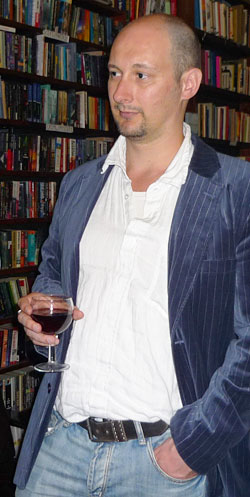
| Jacket 37 — Early 2009 | Jacket 37 Contents page | Jacket Homepage | Search Jacket |
This piece is about 4 printed pages long.
It is copyright © Louis Armand and Jacket magazine 2009. See our [»»] Copyright notice.
The Internet address of this page is http://jacketmagazine.com/37/armand-correspondences.shtml
I walk out in the bleak village and look for you
—Ted Berrigan
1. To begin with, a letter, a copied
address. Dear X,
New York is dying. Berrigan died
twenty-five years ago
waiting for the obituary. All
the great artisans have
forgotten you, once again
embarked upon that second
life, a product
of the god who failed.
I lie awake in the park at night
listening for children’s playground noises.
A dreamless charity
settling the old accounts: Louise’s
rum-mouth, Clare’s vagina,
Petya’s yellowgreen eyes.
Pieces of time and circumstance
in a one-night show, dressed in newspaper
and hazard lights. Broke everything
because you loved
to make things out of pieces.
Jane in the Midwest with her bandaged
ego, Natascha in Germany.
A breakdown-signal flashing a hundred-thousand
Marilyn Monroes, steeled against
some dim freeze of pain and happenstance.
How long can we outlive John Keats?
The act itself is not extensive. It is
a moment’s alcoholic urgency
pressing against you, feminine and tough,
emptying your pockets.
This is what sleep becomes, staring up
into a still, small place, all the outcomes methodised.
2. I was glad to receive your letter.
I was thinking about you just that moment and why I
hadn’t heard from you. You’re my mainstay
from the beginning. My lifeline, my umbilicus. A piece
of autobiography cut-off in mid-wrench.
We were the late ones who made it too soon
into this world. There were
bugs in your brain, white ants and black ants
stealing softly across fields of permafrost. A thousand
red leaves covered them in autumn.
You were the one with eyes like a zoo. Woman-
hater, man-hater, snarling down 14th street.
I never knew you, I only wanted to be real,
pretending to follow-on into the disconnect.
A chair beside a window, a face or a piece
of furniture. Minimal driftage of an ear’s
desolate murmuring, of rain stirring ashes into tarmac.
We grew up naked in the afternoon, into the same
non-story. A maternal ear and dead perfume:
staring at the cellophane, the mascara windows, the
neon meat hanging there by the thinnest of threads.
3. A naked man in a window behind Fifth Avenue.
Six A.M. breakfast special: Fear eats the soul.
Time to arrange a new day, take it up and lock it.
Walking and forever walking beneath a sun that burns
a white hole in the sky. Anachronisms loom up
everywhere in this city, like The Brain that
Wouldn’t Die, Terror Creatures from Beyond the Grave.
Shocking but true! And now we’re all here,
wandering through the eye’s atomic fallout shelter.
Sex pictures of a captive mind: The Infamous
House of Madame X or The Diabolical Doctor Z
and his Fiendish Creation. Will it ever be possible
to find our way back through games and repetition?
The headlines have nothing new to say.
All in place, nothing in order; whole in spite
of being pieces. The crowd goes on with its life of
nonsense, embarrassing us into joining-in. A ceremony
of replacing the foot that precedes with the one that
follows, face to face with the traffic signal’s menace.
4. Sweating it out under night-cover humidity:
how many genetic modifications preceded us?
Daybreak, copping it sweet in Chelsea, Midtown, then
on to 92nd street. Big Charles makes coffee,
fried eggs, toast on the side. Nourishment
if not for the soul (it is important to eat,
come what may). Listening meanwhile at the
talk-machine, hooked into the ear of things.
True stories told in rhyme. We are
all perhaps the adopted points-of-view
of somebody. Should we be blamed for this?
Your letter arrived and I’m sorry too
not knowing where the future lies.
John today is sick, D’s leaving town. (We live
according to details unrequited by History.)
Back again on the Lower East Side, why not
live perpetually in transit? Reading a ping-pong ball’s
return flight—the moment lengthens, days pass
this way. Or the world is nothing more
than an unstable intelligence that cannot decide
what to do with us. Still, there are reasons to inquire.
5. It was mid-June, a type of hysteria overtook us.
We were playing the part of latecomers
to a scene that had passed on. The Yankees
were at home to Pittsburg, jazzmen in the park.
A national hero nobody seemed to recognise
lay passed-out at the foot of the temperance
monument. Who can judge, if the visible world
is just so much furniture beneath a sky painted with
static and feedback? N called from a payphone
in Europe, searching for the secret lives
of other people in faraway places. But these were
only re-enactments. Their promises, hinging upon
facts, could not be held. Dreaming of a man’s
or a woman’s full, bloodied mouth and darkening eyes.
Who engineers the mirror image? We expected
some type of movie, exposing the reason why. But
somebody had left the door open, slipping out
into rain and blackened celluloid. Thoughts, also, escape
at every opportunity: after hundreds of hours
of staring, there is nothing to look at, nothing left to see.
Thanks are due to Michael Hulse and Lou Rowan, editors respectively of the Warwick Review and Golden Handcuffs, where this poem first appeared.

Louis Armand, Prague, 2009
photo by Pam Brown
Louis Armand lives in Prague where he directs the InterCultural Studies programme in the Philosophy Faculty of Charles University. He is the editor of Contemporary Poetics (Northwestern), JoyceMedia (Litteraria) and Mind Factory (Litteraria). His poetry books include The Garden (Salt Publishing, 2001) and Picture Primitive (Antigen Books, 2006). In April 2009 he convened and participated in the Micro Festival Poetry Series in Prague and Brno.